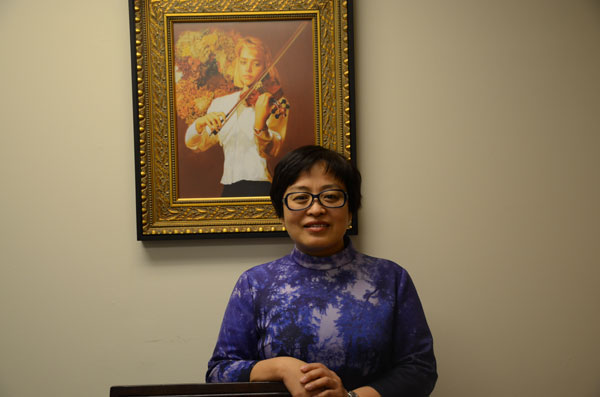Hu Yanyan: the guardian of China Guardian
Updated: 2015-03-20 11:50
By NIU YUE in New York(China Daily USA)
|
|||||||||||
 |
|
Hu Yanyan, director and president of China Guardian Auctions Co. Ltd, stands in the auction powerhouse's office in New York at Park Avenue. Behind her is a replica of Violinist by Chinese painter Chen Yifei, which was auctioned at over $1.5 million dollars. Lu Huiquan / For China Daily. |
Hu Yanyan is leading the transformation of the world's fourth-largest auction house.
Hu, listed by the Financial Times as one of the five most powerful women in Asia's art world, is director and president of China Guardian Auctions Co. Ltd.
The master of museology initially worked as an editor for publications at the Beijing Municipal Administration of Cultural Heritage after graduating from China's prestigious Nankai University. In 1993, she saw a recruitment advertisement from China Guardian.
"My instinct told me it would be a very good job and would be fun," Hu said at China Guardian's office on Park Avenue in New York. By that time, her knowledge of auctions was little more than a catalog of Sotheby's she read at Nankai. But she was determined, so she quit her stable government job and became a specialist in paintings and calligraphy with China Guardian.
People wondered if she was out of her mind, but Hu's instincts were right. China started to license auction houses that year and liberalized the market. Thanks to its economic boom, China is now the world's second-largest art market, handling 22 percent of the global trade volume, according to the TEFAF Art Market Report.
In 2012, the burgeoning industry had a sudden slump. Overall art trade volume in China decreased by 47.9 percent, and Guardian's sales volume went from a peak of $17.6 billion in 2011 to $8.3 billion in 2012, before rebounding to $10.5 billion in 2013, the latest data available. Many believe the government's anti-corruption drive is behind the slowdown.
"There are art works confiscated from corrupt officials, but most of their collections are either fake or from little-known local contemporary artists. They are rarely auctioned through high-end houses like China Guardian," she said. Instead, she told China Daily that the fall was largely due to the business cycle of the industry and the current economic situation.
However, she believes China Guardian needs to transform.
"Past achievements don't mean present advantages," said Hu. "You have to innovate."
Younger Chinese buyers are entering the market. Many of them are just in their 20s and 30s and have studied abroad.
"They are more familiar and interested in Western contemporary art," said Hu.
Meanwhile, more Western collectors are showing interest in Asian art.
The auction powerhouse is expanding its global presence. The company has been working with US buyers and sellers since 1996, but it is in recent years that its New York office has become more sophisticated.
"In the past, our overseas offices are just to receive mails and see clients,"she said. "But now, publicity and other functions have been added. Our sourcing has been global. In the past, we only looked for sellers to China, but now we are also looking for buyers overseas."
The clients overseas are more sophisticated. "They will test you,"she said. "They at least have the basic knowledge. And if they love Chinese art, they will have their own opinion of aesthesis."
Hu is still visiting collectors personally. Professionalism is a must, but sometimes she starts her visit with small talk to make collectors comfortable. At a certain point, collectors will show their collections and be willing to have them auctioned by China Guardian.
China Guardian does not purchase and resell art works; it generates revenue exclusively from its commission fees from transactions, so clients don't have to worry that the company will artificially deflate or inflate prices.
"That's how we build trust,"Hu said. "It's little by little."
The auction house will allow clients to auction online simultaneously with offline particpants in May. It is also recruiting overseas talents to meet the growing taste for contemporary art.
It will not stop at being a company selling Chinese artworks, said Hu. Auction sites will be more than Beijing and Hong Kong in the future, and China Guardian will try to auction artworks from around the world.
Related Stories
Luxury cars go under the hammer at govt auction 2015-03-18 17:07
Oprah Winfrey to auction collectables for charity 2015-03-18 10:23
Christie's to auction landmark Chinese collection 2015-03-11 11:07
Today's Top News
Manhunt launched for accomplices in Tunisian museum attack
Chanel to reduce prices in China
Russian FM slams Kiev for turning Minsk agreements 'upside down'
European chamber calls on China to boost reforms
Chinese firm takes stake in French airport
Putin slams attempts to rewrite WWII history
EU police group launches team to tackle migrant smugglers
Britain needs oil tax cuts to attract North Sea investment
Hot Topics
Lunar probe , China growth forecasts, Emission rules get tougher, China seen through 'colored lens', International board,
Editor's Picks

|

|

|

|

|

|





